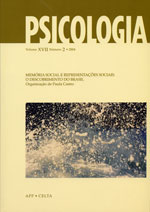The teaching of history in post-colonial times
DOI:
https://doi.org/10.17575/rpsicol.v17i2.452Keywords:
-Abstract
The results of the survey on textbooks used in Portuguese and Brazilian schools are very revealing about the representation of the discovery of Brazil. In what Portugal is concerned, it is clear that the nowadays understanding of the discovery is still closely connected to the old Portuguese colonial imaginary. As for the Brazilian textbooks, they provide a more ambiguous representation of the discovery: colonization is often taken as a synonym of westernization. In addition, in the Brazilian textbooks the positive evaluation coexists with severe critics about the negative impact of the European arrival to South America. On the whole, the textbooks from both sides of the Atlantic show that nowadays it is still difficult to achieve an understanding of the discovery of Brazil outside the master-narrative about both countries' history. This situation is, in part, the outcome of the incapacity of historians from both countries to promote a critical discussion of the European presence in South American lands during the early-modern period. Without such a discussion, it will be difficult to achieve a knowledge less focused on Portugal and more sensible to cultural difference.


